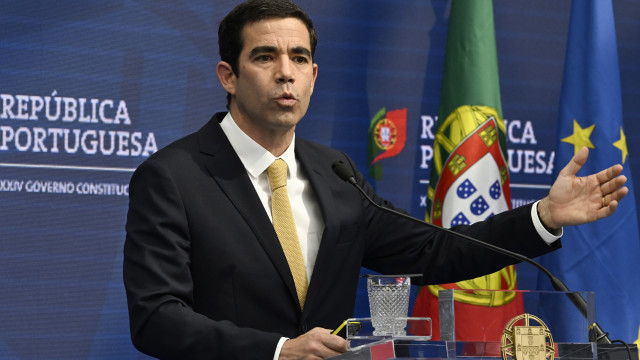António Leitão Amaro unveiled new amendments to the Nationality Law on Monday, introducing changes such as the establishment of a Border Police and the requirement for proficiency in the Portuguese language. Additionally, a tighter watch on serious criminal offenses is promised.
During his presentation, the Minister of the Presidency argued that this proposal “reinforces the demand for an effective connection, a belonging to the national community,” stating that this “robust connection” secures nationality, which defines the nation as a political community.
The official emphasized that “nationality is granted not by default but only if the individual expresses a positive intent,” assuring that the proposal adheres to “humanitarian commitments.”
The main changes proposed by the government have been compiled. See what’s changing and reactions to the briefing led by the Minister of the Presidency.
Minimum of seven years for acquiring nationality
The government plans to extend the current minimum period of five years of “legal residence eligibility for obtaining nationality” to seven years for those from the Community of Portuguese Language Countries and “10 years for others.” The “countdown starts with obtaining the residence permit,” unlike the previous calculation starting from the initial application.
Creation of a border police force
A “foreigners and border unit” has been proposed to reintroduce a “border police” responsible for controlling entries and “executing the deportation and return of those who do not comply with rules.”
The Minister of the Presidency assured, “The solution is not to recreate SEF or transform AIMA into a police force.”
Tightening the noose on crime
Leitão Amaro announced an increase in the “requirement standard of the applicant’s criminal record,” excluding candidates with “actual prison sentences” in contrast to current limitations (only sentences over three years).
Furthermore, the government aims to allow judges to impose nationality loss as an ancillary penalty for naturalized citizens for less than ten years committing certain “serious crimes” with prison terms over five years.

The government intends to enable judges to decree nationality loss as an ancillary penalty for naturalized citizens who’ve been citizens for under ten years who commit certain “serious crimes” with sentences exceeding five years.
Lusa | 17:20 – 23/06/2025
Proficiency in the Portuguese language
“Sufficient language knowledge, as well as Portuguese culture,” and “fundamental rights and duties of the Portuguese Republic” will be required, with “assessment tests” planned.
Applicants will also need to sign a “solemn declaration of adherence to the principles of a democratic rule of law.”
Stricter rules for family reunification
The minister indicated that there will be a “requirement of a minimum two-year legal residency period” for those applying for family reunification, with minors being the only candidates eligible for family reunification residing in Portugal, ruling out the possibility of using this mechanism to regularize those in irregular situations in Portugal.
Leitão Amaro acknowledged that family reunification is “the most difficult of all regulations” due to the need to reconcile national legislation with the European directive on this matter.

The family reunification of regular immigrants in Portugal will be subject to stricter rules, and job-seeking visas will be limited to qualified immigrants, the government announced today.
Lusa | 17:24 – 23/06/2025
New rules for work-seeking visas
Leitão Amaro introduced new rules for work-seeking visas, restricting them to qualified immigrants.
“The visa to come to Portugal without a work contract or promise of contract will remain only for highly qualified individuals,” he stated, indicating the aim is to “redirect demand towards flows that allow for attracting more talent.”
The government will contact “higher education institutions and their representative organizations” to propose an initiative inspired by one adopted with employer associations, ensuring entry channels for workers, and providing “predictability and agility when the conditions for attracting talent are met.”
Extending nationality rights to great-grandchildren of Portuguese citizens
Portugal will eliminate direct access to nationality for Sephardic Jews and extend the right to Portuguese nationality to great-grandchildren of Portuguese nationals born abroad. This extension aims to cater to the “configuration of the Portuguese diaspora,” especially in areas with longstanding emigration, such as Venezuela or the United States.
Visas from the countries of origin for the CPLP
Portugal will require that residence permits for the Community of Portuguese Language Countries (CPLP) always have prior consular visas from the countries of origin, in contrast to current practices in some cases, the government announced today.
Montenegro in Trump’s shoes and the ‘cheguization’ of the PSD?
Following the conference on immigration policy changes, Chega leader André Ventura expressed willingness to negotiate with the government on the proposed changes to the Nationality Law but considered the proposed measures insufficient.
André Ventura considered the announced changes insufficient and overdue, yet acknowledged that the government was “validating what Chega had long argued for” by reaching this discussion, despite being “late” and “playing catch-up.”
Meanwhile, Isabel Moreira from the PS criticized the proposed amendments to the Nationality Law announced by the government on Monday, even comparing Luís Montenegro to Donald Trump.
Moments before the presentation, constitutionalist Vital Moreira, on his blog ‘Causa Nossa’, found the idea of revoking nationality from naturalized citizens for serious crimes “politically shocking” and asserted that “the ‘cheguization’ of the PSD has been set in motion.”




